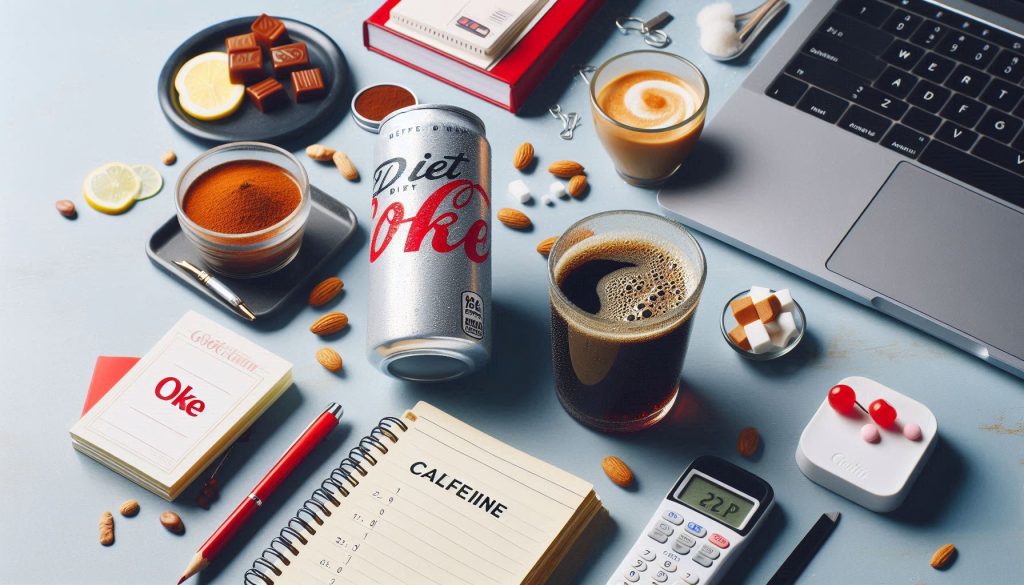How Much Caffeine is in a Can of Diet Coke?
Introduction
Caffeine is a widely consumed stimulant found in coffee, tea, energy drinks, and sodas. Among the most popular soft drinks, Diet Coke is a favorite choice for those looking to enjoy a refreshing beverage without the calories of regular soda. But how much caffeine does a can of Diet Coke contain? In this article, we will explore the caffeine content in Diet Coke, compare it to other beverages, discuss its effects, and answer common questions about its consumption.
How Much Caffeine is in a Can of Diet Coke?
A standard 12-ounce (355 mL) can of Diet Coke contains 46 milligrams (mg) of caffeine. This amount is considered moderate compared to other caffeinated drinks like coffee and energy drinks.
For reference, here’s how Diet Coke compares to other popular beverages:
- Regular Coke (12 oz) – 34 mg of caffeine
- Diet Coke (12 oz) – 46 mg of caffeine
- Coffee (8 oz) – 95 mg of caffeine (varies by brew type)
- Black Tea (8 oz) – 47 mg of caffeine
- Green Tea (8 oz) – 28 mg of caffeine
- Energy Drinks (8 oz) – 70–100 mg of caffeine (varies by brand)
Diet Coke has more caffeine than regular Coca-Cola but significantly less than coffee or most energy drinks.
Why Does Diet Coke Have More Caffeine Than Regular Coke?
One interesting fact about Diet Coke is that it has more caffeine than regular Coca-Cola. While a can of Coke contains 34 mg of caffeine, Diet Coke has 46 mg. This is because Diet Coke was formulated with a different taste profile and target audience in mind. Coca-Cola designed Diet Coke to have a sharper, crisper taste, which is enhanced by a higher caffeine content. Caffeine also acts as a flavor enhancer, providing a slight bitterness that balances the drink’s sweetness.
Caffeine in Different Diet Coke Sizes
While the standard 12-ounce can contains 46 mg of caffeine, the amount varies depending on the serving size:
- 7.5 oz mini can – 28 mg of caffeine
- 12 oz can – 46 mg of caffeine
- 16 oz bottle – 61 mg of caffeine
- 20 oz bottle – 76 mg of caffeine
- 32 oz large cup (fast food size) – 121 mg of caffeine
- 44 oz extra-large cup (fast food size) – 167 mg of caffeine
If you drink larger servings of Diet Coke, you may be consuming more caffeine than you realize. This is important to consider if you are sensitive to caffeine or trying to limit your intake.
How Much Caffeine is Safe to Consume Daily?
The FDA (Food and Drug Administration) recommends that most healthy adults limit caffeine intake to 400 mg per day. Consuming more than this amount may lead to negative side effects such as insomnia, headaches, or increased heart rate.
For comparison, here’s how much Diet Coke you could safely consume within this limit:
- 8.5 cans of Diet Coke (12 oz) = ~400 mg caffeine
- 5.2 bottles of Diet Coke (20 oz) = ~395 mg caffeine
- 3.3 large fast food cups (32 oz) = ~400 mg caffeine
However, sensitivity to caffeine varies from person to person, so it’s important to listen to your body and adjust your intake accordingly.
Effects of Caffeine in Diet Coke
Caffeine affects the body in several ways. Here are some key effects of consuming caffeine from Diet Coke:
1. Increased Alertness
Caffeine is a stimulant that helps improve focus, attention, and wakefulness by blocking adenosine, a neurotransmitter responsible for making you feel sleepy.
2. Temporary Energy Boost
Drinking Diet Coke can give you a mild energy boost, making it a popular choice for those needing a quick pick-me-up during the day.
3. Possible Sleep Disruptions
Since caffeine stays in the body for several hours, drinking Diet Coke in the evening may lead to difficulty falling asleep.
4. Increased Heart Rate and Blood Pressure
Some people may experience a temporary increase in heart rate and blood pressure after consuming caffeine.
5. Potential for Caffeine Dependence
Regular caffeine consumption can lead to dependence, meaning some people may experience withdrawal symptoms such as headaches, fatigue, and irritability if they stop drinking Diet Coke suddenly.
Is Diet Coke a Good Source of Caffeine?
Diet Coke is a moderate source of caffeine, making it a suitable option for those who want a caffeine boost without the stronger effects of coffee or energy drinks. However, it lacks the additional health benefits found in natural sources of caffeine, such as antioxidants in coffee and tea.
If you are looking for a low-calorie way to consume caffeine, Diet Coke can be a convenient choice. However, keep in mind that excessive consumption may lead to negative effects associated with caffeine intake.
Frequently Asked Questions About Diet Coke and Caffeine
1. Can You Drink Diet Coke Every Day?
Yes, Diet Coke can be consumed daily in moderation. However, if you rely on it for caffeine, consider balancing your intake with other sources of hydration, like water.
2. Does Diet Coke Contain More Caffeine Than Coffee?
No, coffee has significantly more caffeine than Diet Coke. A standard 8-ounce cup of coffee contains about 95 mg of caffeine, while a 12-ounce can of Diet Coke has 46 mg.
3. Is Diet Coke Bad for You?
While Diet Coke is low in calories, it contains artificial sweeteners like aspartame, which some studies suggest may have health risks. However, moderate consumption is generally considered safe for most people.
4. Can Diet Coke Help You Stay Awake?
Yes, the caffeine in Diet Coke can help increase alertness and reduce drowsiness, making it a common choice for staying awake during the day.
5. How Long Does Caffeine Stay in Your System?
Caffeine has a half-life of about 5 hours, meaning that if you consume 46 mg of caffeine from a Diet Coke, approximately 23 mg will still be in your system after 5 hours. The effects vary based on individual metabolism.
6. Does Diet Coke Have More Caffeine Than Energy Drinks?
No, most energy drinks contain significantly more caffeine than Diet Coke. For example, an 8-ounce can of Red Bull has 80 mg of caffeine, nearly double the caffeine in a 12-ounce Diet Coke.
Conclusion
A 12-ounce can of Diet Coke contains 46 mg of caffeine, making it a moderate source of caffeine compared to coffee, tea, and energy drinks. While Diet Coke can provide a mild energy boost and help with alertness, excessive consumption may lead to negative effects like sleep disturbances and caffeine dependence.
If you enjoy Diet Coke, it can be a refreshing and low-calorie way to consume caffeine. However, it’s essential to stay mindful of your overall caffeine intake and how it affects your body. By drinking Diet Coke in moderation, you can enjoy its taste and benefits without overloading on caffeine.
For those looking for an alternative, natural caffeine sources like coffee, tea, or matcha may provide additional health benefits along with their stimulating effects.




